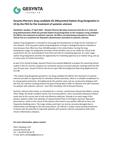Gesynta Pharma's drug candidate GS-248 granted Orphan Drug Designation in US by the FDA for the treatment of systemic sclerosis
Stockholm, Sweden, 27 April 2022 - Gesynta Pharma AB today announces that the U.S. Food and Drug Administration (FDA) has granted Orphan Drug Designation to the company's drug candidate GS-248 for the treatment of systemic sclerosis. GS-248 is currently being evaluated in a Phase II clinical trial as a treatment for Raynaud’s phenomenon secondary to systemic sclerosis.
Orphan Drug Designation is intended to encourage the development of drugs for the treatment of rare diseases. FDA may grant orphan drug designation to drugs or biological products intended to treat diseases that affect less than 200,000 people in the United States. During the drug development stage, the designation provides certain benefits such as tax credits for clinical trials conducted in the US, and exemption from FDA user fees for marketing approval. At a later stage, orphan drug designation provides the opportunity for marketing approval as an Orphan Drug, and up to seven years of market exclusivity.
As part of its overall strategy, Gesynta Pharma has worked diligently to prepare for upcoming clinical studies in the US, and the company has conducted several successful advisory meetings with the FDA over the past year. Gesynta Pharma also has an open IND (Investigational New Drug Application) for GS-248.
"The orphan drug designation granted to our drug candidate GS-248 for the treatment of systemic sclerosis provides an opportunity for extended market exclusivity, which is a valuable complement to its strong patent protection. Strengthened by this positive news and our constructive dialogue with the FDA, we continue working towards the goal of being able to offer an effective and safe treatment for patients with systemic sclerosis," says Patric Stenberg, CEO of Gesynta Pharma.
Systemic sclerosis (also known as scleroderma) is a chronic, autoimmune disease that affects, among other things, the body's smallest vessels, the microvasculature, and is associated with great medical needs due to the current lack of safe and effective medicines. Already at an early stage of the disease, patients suffer from episodes of impaired blood flow in the fingers and toes, Raynaud's phenomenon, which in the course of the disease often lead to very painful, difficult-to-heal, and frequently disabling ulcers. The lungs, kidneys and heart can also be seriously damaged due to inflammation and damage to the microvasculature. GS-248 has a unique and promising mechanism of action with the potential to help both patients with systemic sclerosis and patients with other chronic inflammatory diseases.
For more information, please contact:
Patric Stenberg, CEO
Gesynta Pharma AB
Tel: + 46 (0)733 83 66 70
E-mail: [email protected]
About Gesynta Pharma AB
Founded in 2017, Gesynta Pharma bases its R&D on research from the Karolinska Institutet. The most advanced drug candidate, GS-248, reduces inflammation and increases blood flow in the microvasculature, thereby having the potential to provide improved treatments for several serious diseases. In an ongoing clinical Phase II study, GS-248 is being evaluated for its capacity to normalize vascular blood flow and reduce pain in patients with the autoimmune disease systemic sclerosis. Positive results from this study may lead to a rapid broadening of the development program towards additional chronic inflammatory diseases. Major shareholders include Industrifonden, Linc, Hadean Ventures, and a number of successful life science entrepreneurs. For more information, please visit www.gesynta.se.
Om Gesynta Pharma
Prenumerera
Få löpande information från Gesynta Pharma via e-post.
